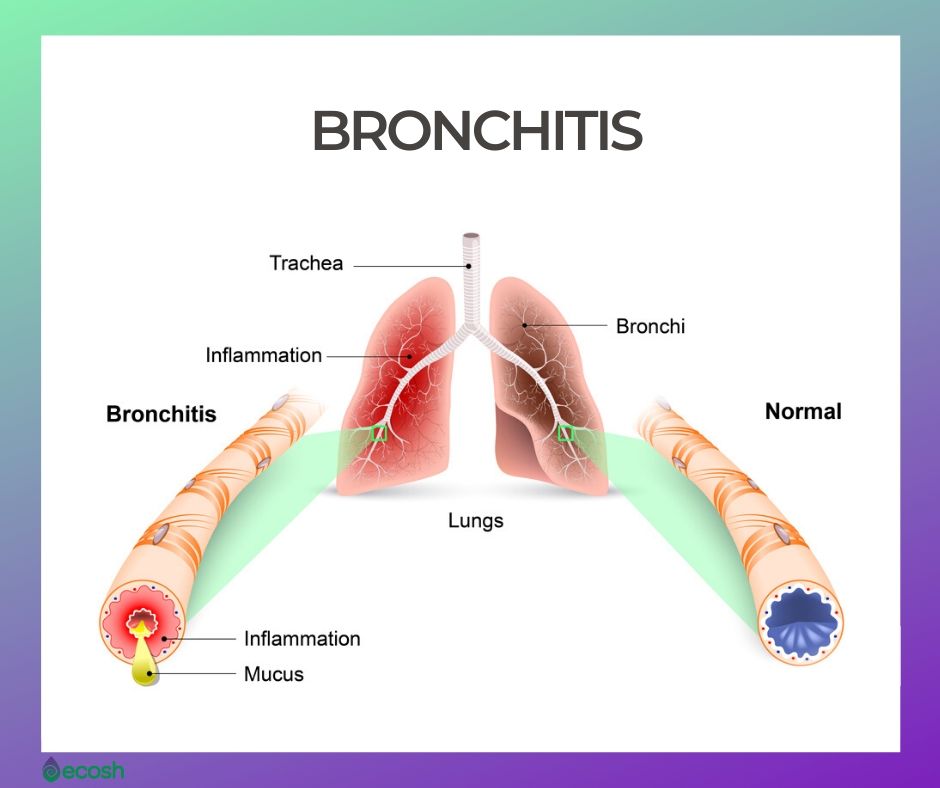
Bronchitis is an inflammation of the bronchial tubes in the lung and airways of the lungs. Bronchitis can affect adults as well, while more often affecting younger children. Bronchitis is also known as chronic obstructive pulmonary disease (COPD) because it affects the ability of the lungs to receive oxygen. This condition can also cause coughing, shortness of breath and wheezing. Bronchitis is often acute or chronic in nature so that the exact duration of a patient has the condition depends on how severe the condition is.
In general, acute bronchitis lasts for about two weeks. During this time, symptoms can include coughing, wheezing, tightness in the chest, and shortness of breath. In addition, other health problems such as fever and fatigue may occur as well. It's important to note, though, that even though acute bronchitis lasts only for two weeks, it doesn't necessarily mean that the individual will suffer from the condition indefinitely. Chronic bronchitis, on the other hand, lasts a lot longer.
Although bronchitis is a serious ailment, there are several things you can do to decrease the length of time your chronic bronchitis lasts. First, you should always keep a check on your condition. Make sure you don't have an upper respiratory infection and ensure that you're getting enough rest. You should also avoid exposing yourself to irritants such as chemicals, smoke, pollen, and airborne irritants. You should also make sure your immune system is strong enough to fight off the germs that lead to bronchitis.
When it comes to treatment for your chronic bronchitis, you have several options. One of the best ways is to use natural remedies. They are very effective at relieving pain and clearing up congestion, as well as improving lung function. You should also take measures to improve your immune system. Since chronic bronchitis can cause damage to the lungs, preventing it from spreading to other areas is very important. The following discussion will look at how long does bronchitus last and the different treatments available for it.
There are many factors that contribute to how long does bronchitis lasts, but one of the most important ones is the overall health of the lungs. Poorly functioning lungs are one of the major reasons why the bronchial tubes become inflamed. It can also result from a poor diet. This is why people with a poor diet have a greater chance of developing bronchitis than those who eat healthily.
The other thing that can affect the amount of time that chronic bronchitis lasts is your personal lifestyle. A person who has a sedentary lifestyle may have lessened symptoms of bronchitis while an active person has more. It's important to ensure that you get enough rest and a good diet if you want to be able to get rid of your ailment completely.
If you are an active person, the length of time your chronic bronchitis lasts is less. As mentioned previously, it can also be affected by your lifestyle. However, if you have a job that requires you to move around frequently or if you have asthma, then your chances of developing bronchitis is increased. Your body's resistance against infection may also play a big role. People who are prone to getting colds or allergies are more likely to develop bronchitis than those who are not. Also, you are more susceptible to having a respiratory infection when you smoke cigarettes.
Bronchititis can last for several years. However, it can be short-lived if your diet is poor and you don't exercise regularly. Make sure you take care of yourself and your body to enjoy life.

OCD The definition is very complex and difficult to describe as there are many different ways to define it. In its simplest form, OCD can be defined as a condition in which a person repeats disturbing thoughts about themselves. This is called obsessive-compulsive disorder and, in its worst form, can lead to serious complications such as delusions, hallucinations, and even suicide attempts.
If you've ever been diagnosed with OCD, you know how devastating it can be. When you have OCD, irrational fears of being incompetent or getting sick can prevent you from functioning in life. Even after you have been treated for OCD, you will be plagued by irrational thoughts that can affect your daily life. It is extremely important to understand OCD and understand what it is so as not to fall into the trap.
According to the definition of OCD, obsessions, fears, and compulsions are linked to each other. It is believed that all this should happen in a certain order. The first part of the definition is that in most cases these rituals are performed by repeating the behavior over and over again. Once a behavior becomes habitual and you can't help but do it, you must do it to get rid of it.
When a person suffers from obsessive-compulsive disorder, they will behave in the same way again, trying to end their symptoms. They will have to repeat this behavior again to heal.
It's important to remember that OCD is not something that can be beaten or cured overnight. People with OCD need to learn how to deal with the disorder every day. It is also important to know that if you suffer from this condition, you are not alone. Millions of people suffer from this disease around the world.
People with OCD may also feel as though they are not able to function normally in social situations. It is important to make sure that you take medication for Obsessive Compulsive Disorder as soon as you can so that you can start the treatment process and help to improve the way that you live your life.
People who suffer from Obsessive Compulsive Disorder will find that the disorder is not something that can be eliminated overnight. This disorder can only be cured over time. People with OCD have to be patient and understand that they are going through a period of adjustment. If you want to beat OCD, you will have to overcome the obstacles and try to find a treatment program that is best suited for your needs.
Once you have suffered from Obsessive Compulsive Disorder for an extended period of time you will need to seek treatment. You will need to understand that the road ahead will be challenging but in the end you will be glad you took the steps to get your life back. Once you have been treated and the disorder has been treated, you will be free to go on with your life and no longer be plagued by the fear that you will become another statistic.